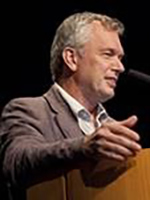 |
||
Home > TERATEC FORUM > Workshops > Workshop 1
Tuesday June 22 - Technical workshop
Workshop 01 - 14:00 to 16:00
Europe is on its way towards "Hybrid Qomputing"
Organised and moderated by Kristel Michielsen, Jülich Supercomputing Centre, Guillaume Colin de Verdière, International Expert in HPC, CEA, and Jean-Philippe Nominé, HPC Strategic Collaborations Manager, CEA
The Atos Quantum Program: Paving the way to quantum-accelerated HPC
By Jean-Pierre Panziera, Chief Technology Director for Extreme Computing, Atos
Quantum Computing promises to support the resolution of problems that are currently intractable to the most powerful supercomputers. Quantum hardware technology is reaching a new phase of its history: the NISQ* era. These near-term platforms, will be well-suited for an integration with classical HPC systems to perform hybrid workflows. In order for this evolution to be fruitful, some three key ingredients must be available:
-
Universality – As of today, there are several competing quantum technologies (quantum circuit, Hamiltonian simulation, quantum annealing) which could be used to solve actual use cases. All of these technologies, regardless of their maturity, should be exposed to users within the same framework so that they can compare their performances.
-
Education - Building efficient applications for quantum accelerators requires programming and algorithmic skills that differ from those that are currently taught in computer science courses. Acquiring them takes time and should rely on the right tools.
-
Application-driven integration –The integration of NISQ platforms in HPC ecosystems will only make sense if it serves practical and impactful applications such as quantum chemistry or combinatorial optimization.
The Atos Quantum Learning Machine (QLM) is a unique platform that provides a path to an integrated approach for HPC and Quantum Computing. QLM supports all available quantum technologies it allows to simulate their behavior and compare them, it’s also a unique education and training tool to build quantum experience and finally it will interface with real quantum HPC accelerators which are planned as soon as 2023. Thanks to this hybrid computing structure, end-users will be able to accommodate all types of QPUs (Quantum Processing Units) depending on the maturity of the technology and their corresponding applications.
*NISQ: Noisy Intermediate-Scale Quantum
 |
Biography: Jean-Pierre Panziera is the Chief Technology Director for Extreme Computing at Atos. He is also the Chairman of the ETP4HPC association and of the EuroHPC Research and Innovation Advisory Group (RIAG). He started his career in 1982 developing new algorithms for seismic processing in the research department of the Elf-Aquitaine oil company. He then moved to the Silicon valley as an application engineer and took part in a couple of startup projects, including a parallel supercomputer for Evans & Sutherland in 1989. During the following 20 years, he worked for SGI successively as application engineer, leader of the HPC application group and Chief Engineer. In 2009, he joined Bull, now an Atos company, where he is responsible for the HPC developments. Jean-Pierre holds an engineer degree from Ecole Nationale Supérieure des Mines de Paris. |
|---|
Register now and get your badge here
- TERATEC Forum is strictly reserved for professionals.
- Participation to exhibition, conferences and workshops is free (subject to seats available)
- On line registration is obligatory.
For any other information regarding the workshops, please contact :
Jean-Pascal JEGU
Tel : +33 (0)9 70 65 02 10
jean-pascal.jegu@teratec.fr
Campus TERATEC
2, rue de la Piquetterie
91680 BRUYERES-LE-CHATEL
France